There are a lot of elements that might be said to define Souls-like games, but high on the list has to be the genre’s particular approach to pacing. As a group of action-RPGs, they’re defined first by periods of growing, ratcheting tension. You fight through long areas filled with tough enemies, with each one dropping "souls" that you can spend to level up your character, which you risk losing if you die before you reach a safe place where you're able to spend them.
Following the build of tension is the release, when you finally make it to the safety of a checkpoint, stopping to refill your health, enhance your character, and catch your breath before setting out into danger again. You're constantly making the same difficult decision: Do you risk going forward for greater rewards, or return to safety and grow your strength, knowing you'll have to fight through all the dangers you just faced once again?
Though Lords of the Fallen ticks off many items from the list of things that Souls-like games are known for, it's the ebb-and-flow pacing, or rather the lack of it, that vexes the most. There's a combination of elements at play--the game's meandering level design, the spongy enemies you face as you progress, the uneven checkpoint and death systems--that creates a series of long and frustrating slogs. Lords of the Fallen is a game that has all the right Souls-like elements on-hand, but never quite gets the proportions right.
The main element that sets Lords of the Fallen apart is the Umbral realm, an alternate dimension that sits on top of the world you see as you play through the game. As a Dark Crusader adventuring across the world in hopes of stopping the return of an evil god, you have the unique capability of interacting with and even entering the Umbral. And it's through the Umbral that you can actually cheat death--when you take too much damage, you're knocked into the Umbral dimension rather than killed outright, giving you a second chance to heal and survive.
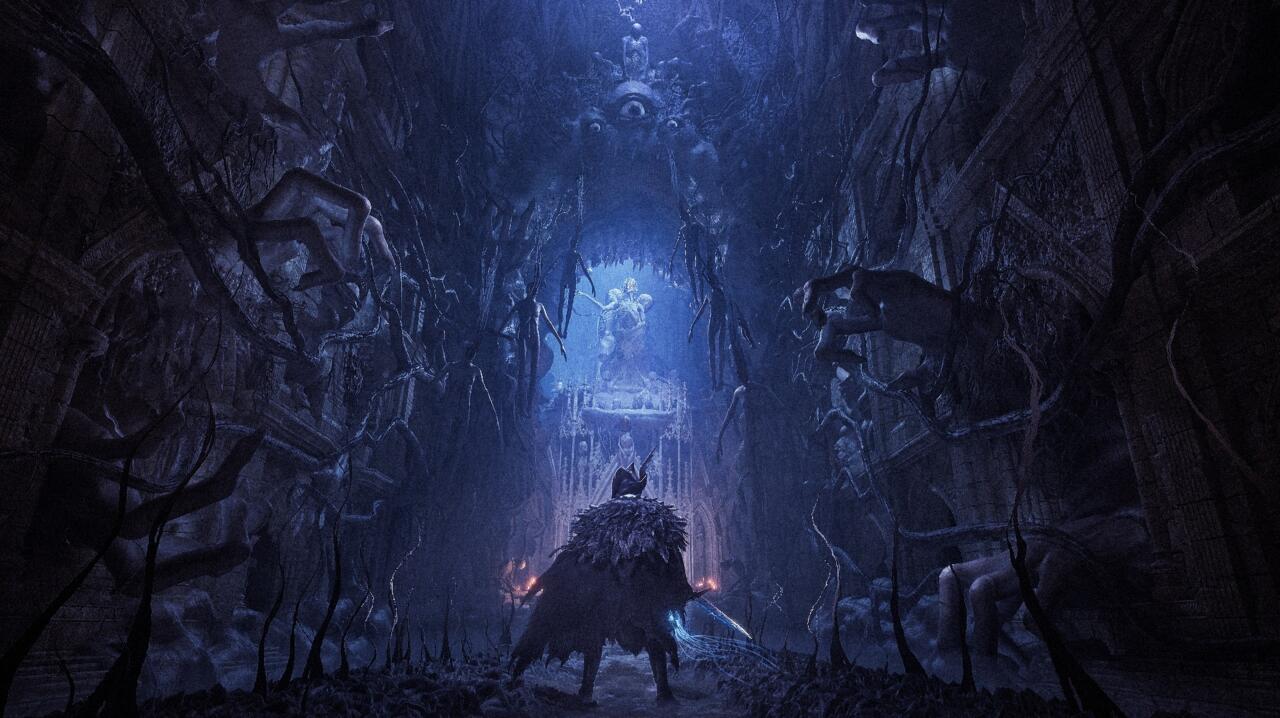
Often a dead end, large gap, or blocked path can be negotiated by entering the Umbral, where platforms or ladders that don't appear in the real world might exist, so venturing between the two worlds is a major focus. Accessing that alternate dimension is done with your Umbral Lamp, which you'll use in both exploration and combat. You can use the lamp to zap yourself straight into the Umbral proper (but not back to the real world; that's done with special corpses you'll have to seek out), or just raise it to get a glimpse at what's ahead in the alternate dimension.
When you gaze into the Umbral, however, it gazes back. It's filled with monsters who are normally not part of your reality, but who materialize and threaten you within the Umbral (or if you hold the veil open too long with your lamp). In fact, the longer you spend there, the more dangerous it becomes. Enemies hunt you, appearing in front and behind at intervals, with their numbers increasing over time. You're also uniquely vulnerable in the Umbral because you can be fully killed, which sends you back to the last checkpoint, or "vestige," you visited. What's more, while you're in the real world, enemies in the Umbral are invisible and can't interact with you. But while you're in the Umbral, the creatures of the real world can still see you--and hurt you.
The Umbral is a frightening place where even the walls and ground are alive and pulsating, and hungry creatures stalk your every move. The Umbral helps to make Lords of the Fallen feel enormous and alive in an eerie way, while providing some inventive opportunities for navigation and puzzle-solving at key moments. As an addition to the usual Souls-like formula, the Umbral is a great idea. It can help you survive a mortal blow, but once you're forcibly thrown into it, the dangers you face only increase, and you're hunted as long as you're there.
However, in practice, the Umbral only adds to Lords of the Fallen's underlying issues. It contributes to throwing off the pacing of exploring the game's world and adds to, rather than alleviates, frustrations in combat.
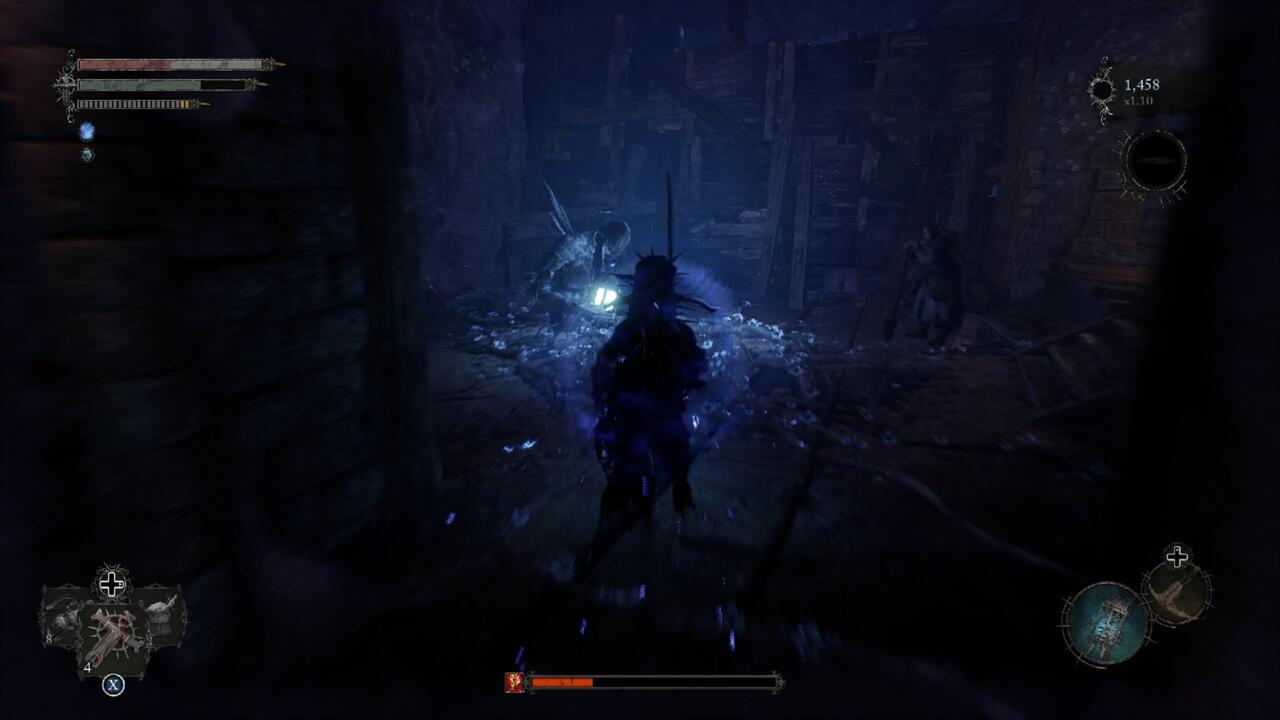
The most egregious pacing issue is in the level design. The game takes you through a variety of dark fantasy locales that are all suitably ravaged and horrific, and when paired with frequent leaps into the Umbral, they create a frightening place to explore. But while Lords of the Fallen's locations are long on atmosphere, they're also sprawling and twisting in a way that makes them painful to navigate.
The primary problem is the checkpoint system. As in other Souls-likes, every so often in Lords of the Fallen, you'll come across a vestige. Here, you can level up, fast travel to other vestiges, and rest, which refills your health and the healing charges in your Sanguinatrix (read: Estus Flask), while also respawning all the enemies in the area.
Vestiges you find in the world are permanent, but they're few and far between. However, you can also create your own checkpoints at specific places by placing an item called an Umbral Seed in a flower bed found in the Umbral.
As an idea, the Umbral Seeds sound like a potential improvement on the usual Souls-like approach to checkpoints, but they're actually a mess. Seeds are rare, mostly coming from defeating bosses, and if you don't have one, you can't create a checkpoint.

Couple this lack of checkpoints with levels that pile tough enemies together in rapid succession and it’s a recipe for frustration. Many times, when you enter a new area, you'll jump into a mini-boss fight against an enemy that's not quite as tough as Lords of the Fallen's main bosses, but tough enough. Soon after you defeat these enemies, you'll start seeing them in levels as regular enemies.
The thing is, Lords of the Fallen has a tendency to reward killing a big former-boss enemy with another one just ahead. And another one after that. And another after that. Stacking enemies like these in a row means long, slow fight after long, slow fight, where a mistake or two means death--and that means redoing all those other long, slow fights.
Now throw in extensive side paths, Umbral detours, and shortcuts that take you into cul-de-sacs in every level, often without you realizing it. These areas are just as dangerous as the main pathway and look just as important, but mostly just hand out weapons and armor. On numerous occasions, I lost hours in Lords of the Fallen to side areas that didn't matter, full of battles that weren't necessary, usually rewarding me with weapons my character stats couldn't handle.
Some Umbral flower beds are placed in extremely inopportune spots, as well. There are flower beds left in the middle of groups of enemies, for example, so that if you use a seed, you'll wake up surrounded by adversaries; but you also don't know how long it'll be until the next bed. Sometimes you'll find a flower bed just before a room filled with difficult enemies, and then another bed on the other side, so that you might feel like you wasted your seed on the weaker position. What's more, you can only have one seed planted at a time, forcing you to sacrifice your old checkpoint for a new one--so you better hope you're picking a place that's actually useful.
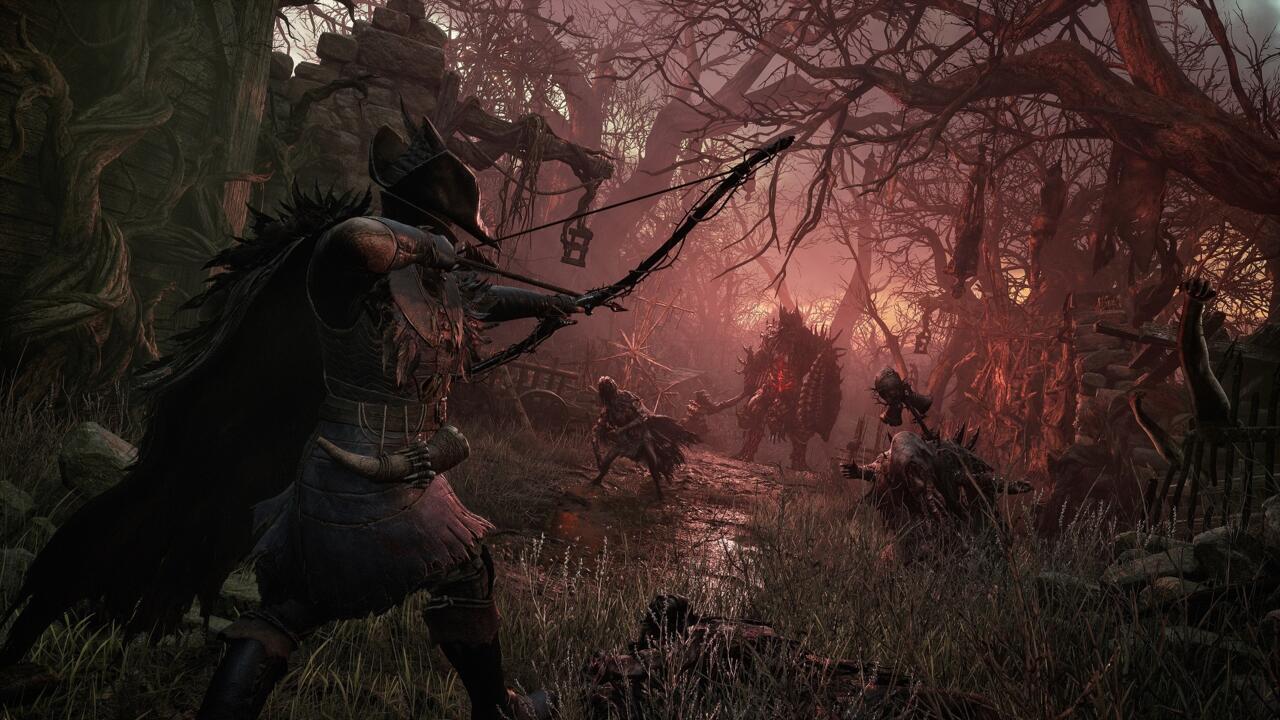
It's possible to buy more Vestige Seeds from an Umbral vendor in the main hub area, but they're not exactly cheap, so this is a running tax on currency you would otherwise spend on leveling up. I made sure I always had seeds on-hand after too many instances of losing huge amounts of progress to the lack of a checkpoint.
Lords of the Fallen's levels are so full of irritating, lengthy fights, with so few rewards in the form of safe places for a breather, that at some point I started just sprinting past whole hordes of enemies. It's generally quicker, easier, and less tedious to just run for it, even in new areas, and blow past a bunch of arduous and time-consuming minor battles to try to find a flower bed and skip them altogether. There's no increasing tension followed by sweet relief in Lords of the Fallen: just a series of slogs. The messy checkpoints and confusing level design undercut what fun there might have been in exploring the beautiful world of Lords of the Fallen, and it receives few additional favors from its combat.
As with other Souls-likes, Lords of the Fallen focuses on players doing slow, heavy attacks, blocking incoming strikes with shields, and slipping past blows with a dedicated dodge move. In most ways, the combat feels pretty standard to the genre, and Lords of the Fallen is at its best when it's putting you through battles against interesting and weird boss enemies who tend to oscillate between towering corrupted knights and twisted demonic monsters. And yet pacing issues persist even in the combat, as every battle, from skirmishes with the game's common foes to titanic clashes with its best bosses, seems to take forever.
There's a bit of a joke in the souls community that if you're having trouble with a boss, try dodging left--often it's a simple way to slip under attacks and can turn seemingly impossible battles into trivial tangles. In Lords of the Fallen, you don't even need to dodge left if you dodge at all. The dodging system is incredibly forgiving, providing you a ton of invincibility frames within the animation to avoid all damage from an attack, often even if you dodge late or poorly. Generally, dodging is so effective that there's rarely any need to use the game's blocking or parrying systems. Dodge left, attack, win fight.
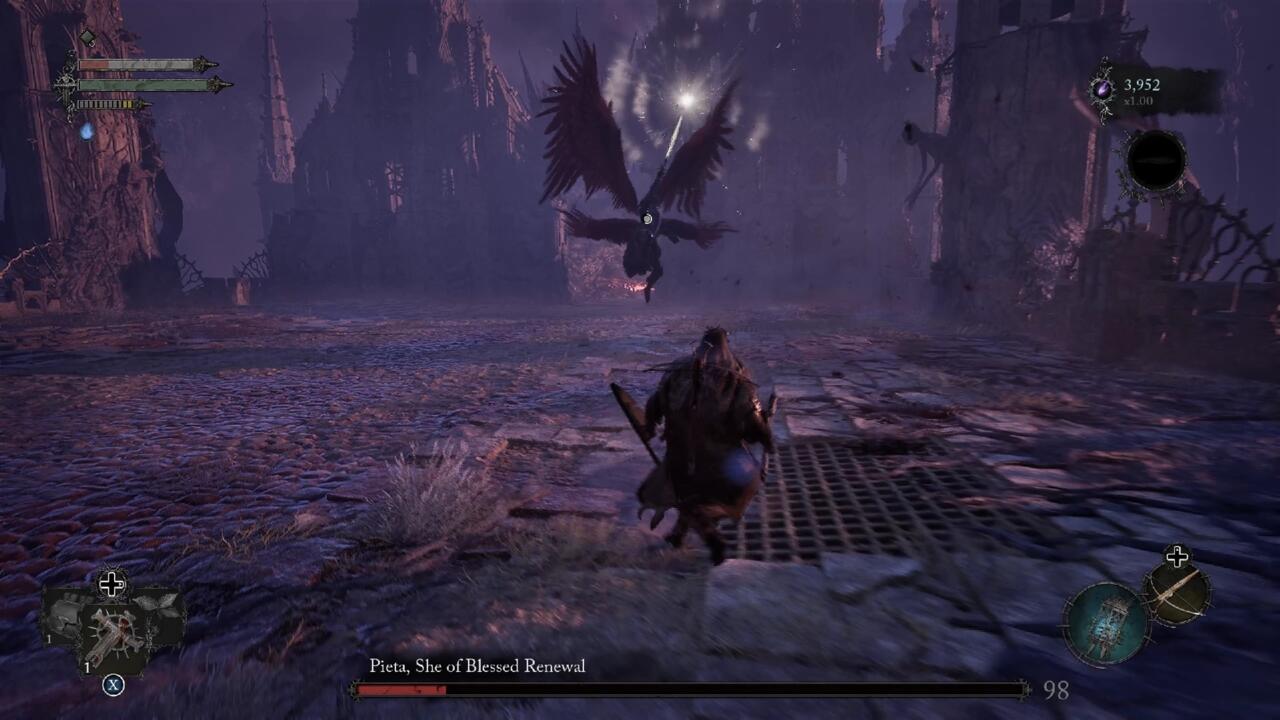
With dodging so incredibly forgiving, it's pretty easy to get the sense of a fight, even against a tough boss, after a few tries. But Souls-likes are supposed to be difficult, right? You can't just steam-roll a boss by slipping past every single attack and laying into them during the openings. These things are supposed to challenge players, to give them a sense of accomplishment--to take many tries.
You can see where the issue develops. To compensate for the extremely generous (and, it must be noted, extremely fun to use) dodge, Lords of the Fallen puts the brakes on the speed with which you can take an enemy down. Sure, you can slip past four or five swings and get in an attack or two when there's an opening, but it feels like the health pool on every enemy, and especially bosses, is massive. So your one or two hits, especially with lighter, one-handed weapons, feel about as effective as whipping rocks at a T-Rex.
This is why running past huge groups of enemies in search of a checkpoint becomes the go-to strategy. When you run into an enemy you previously faced as a boss, you know not only is that thing going to hit you really hard if you screw up dodging its attacks, but that you're going to have to plink away at it for a really long time. That'd be fine if Lords was throwing one or two of these fights at you and then rewarding you with a rest or a shortcut back to an earlier position so you can skip those fights in the future, but it doesn't. Instead, you're rewarded with fight after fight that moves like mud.
Boss fights suffer from this pace-killer as well, because they overcompensate for your ridiculous dodge ability by dragging things out until you make a mistake. There are some really impressive bosses in Lords of the Fallen, many of which have great move sets and provide real challenges. But they all last well beyond excitement and into frustration because every one of them continues to test you long after you feel like you've achieved mastery of the situation, simply because they take forever to kill. Lords of the Fallen boss fights start to feel like Groundhog Day loops, where you know every move before it happens, but you're still stuck there.
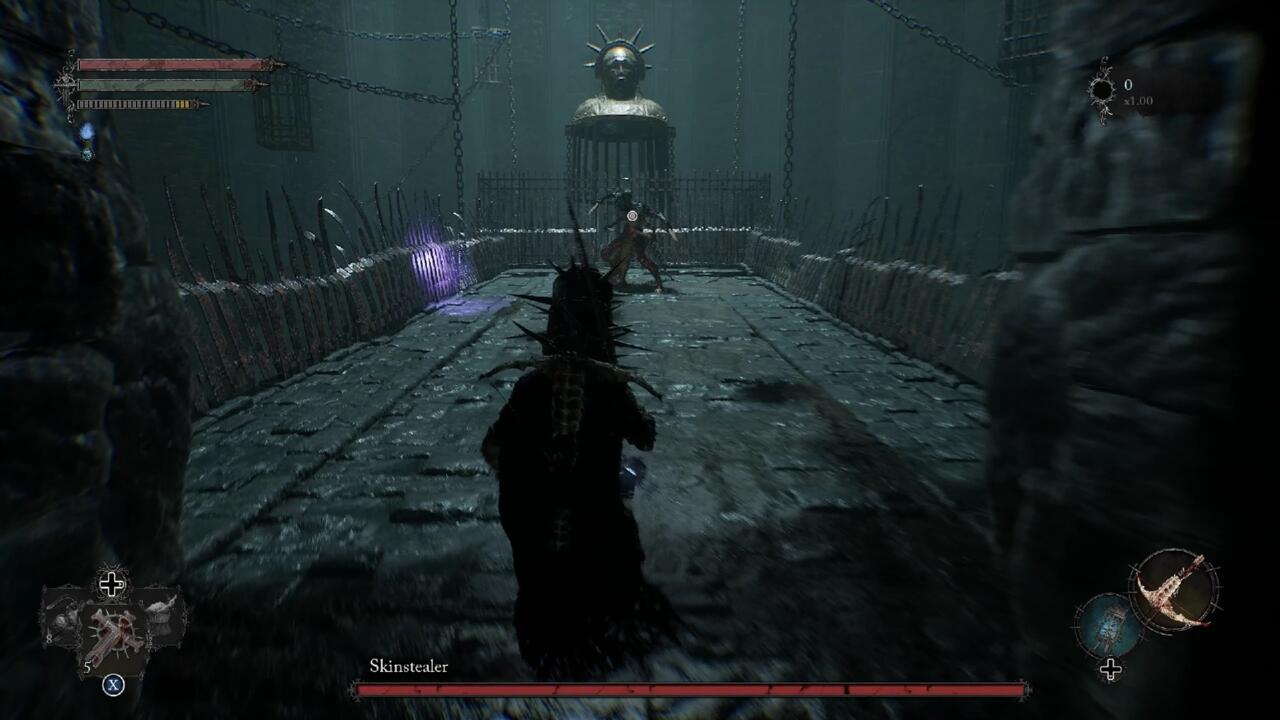
There's a parry system in Lords of the Fallen as well, but the way it works, coupled with the efficacy of the dodge, means it's often best to ignore it. On paper, parrying is a worthwhile system with great effects. Perfectly timing your blocks lowers an enemy's "posture," marked by a small meter that appears near their health, and once it's emptied, you get a chance to perform a big Grievous attack, much like a Dark Souls riposte or Bloodborne Visceral attack. Regular attacks and charged attacks also lower posture, just like the parry systems in Sekiro: Shadows Die Twice or Lies of P, so this is something you want to be looking for opportunities to do in fights. Or it would be, until you realize it's not nearly worth the risk.
The penalty for blocking anything, even with a perfect parry, is that you suffer from "withered health," which turns a chunk of your health bar gray. Withered health is another cool-sounding system on paper, playing like Bloodborne's rally system or Lies of P's guard health system. You can get your withered health back as regular health for landing strikes on enemies, but if you take a hit, you lose all your withered health, plus the regular health you would have lost normally. So blocking and parrying can help you tank a hit, but also build up a health debt that forces you to be extra careful.
The trouble is that the rewards never make the risks of the withered health system worth it. Usually, blocking an attack just leads you into getting hit by the next one, costing you the withered health and more. The timing required for dodging is hugely more forgiving than that required for parrying and comes with no penalty, so standing your ground is only necessary in a few edge cases.
And this is where the good idea of that second chance of landing in the Umbral upon death loses its luster as well. When you travel into the Umbral, you get your health back, but half of it is withered, so you immediately have to start fighting to get back up to full strength. Any healing you do in the Umbral is less effective as well, with some of it being withered. Okay, sure, fine ideas, providing you a second chance on death but making the situation more risky--except the Umbral has more enemies than the real world and they spawn in around you over time. Often, a bad situation just gets worse when you wind up in the Umbral because the number of foes you're facing gets compounded.

So now you're dealing with the thing that killed you, plus more enemies, and they all take a bunch of hits to kill, and you're losing any health that's withered on top of whatever a regular hit would cost you, with less room to maneuver because the enemy density is higher. That Umbral second chance is now more like an Umbral gang beating. And that's if the enemy who killed you doesn't just immediately slay you as soon as you stand up, slapping away your worthless withered health along with the rest of your real health.
There are a lot of potentially cool things about Lords of the Fallen. Its world is vast and beautiful, with a story of a series of religious zealots falling to corruption and ambiguous characters making you wonder if what's defined by orthodoxy as evil is really so bad. The Umbral dimension itself is an excellent addition that makes every location creepier and more interesting than it otherwise would be. And combat can be fun, especially against the game's most imaginative and challenging bosses.
But the game just can't get the proportions right. The fun of risk-and-reward gameplay comes from actually earning the rewards; if the rewards aren't good enough, or if the risk is too heavy, the fun turns to frustration. For all of Lords of Fallen's good ideas, it struggles to make the payoff worthy of the investment. Its meandering level design and slogging encounters turn challenge into tedium, leaving a feeling that getting up and doing something else would be time better spent.